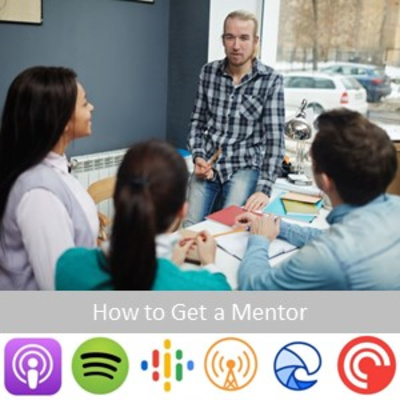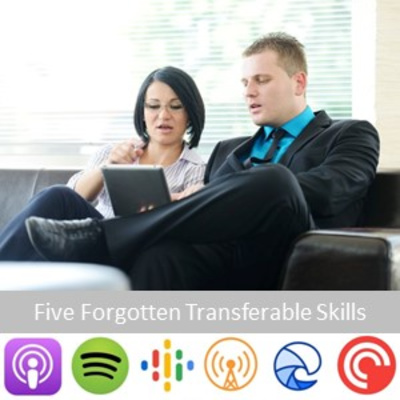Discover Dr. Richard Huysmans' Podcast
Dr. Richard Huysmans' Podcast

Dr. Richard Huysmans' Podcast
Author: Dr Richard Huysmans
Subscribed: 3Played: 105Subscribe
Share
© Dr Richard Huysmans
Description
Dr Richard Huysmans is a speaker, author, trainer and coach. He's worked with hundreds of PhD students and researchers across Australia and the world. In this podcast, Richard covers all parts of PhD and academic life. From being a better PhD student, to being a better PhD supervisor to writing papers, or getting funded.
212 Episodes
Reverse
Social media is a key part of your research communication arsenal. Facebook is the largest social network. It has more than 2.4 billion active users. But what does it mean to a researcher? How can you get access to a small slice of that attention? In this webinar Richard goes through some of the things to consider when using Facebook for your research and factors that might make Facebook more or less successful.
Getting funding as a researcher – let alone an early career researcher or PhD student – is increasingly difficult. And everyone is being encouraged to get an industry partner. But how do you know what they want? Especially for biomedical sciences where drug discovery takes YEARS and heaps of money? In this webinar I’ll look at how you can identify what you have to offer beyond the obvious “your research expertise”.
COVID-19 is causing many governments to enforce social isolation measures. Success as an academic or PhD might, at times require social isolation. However, it is not cool when everyone else is forced to be at home with us. So, how are you coping? What are you doing? What work are you able to focus on solely from home? How will it impact your PhD? What about your research?
In this community-led discussion a forum for these questions to be asked and answered.
Getting funding as a researcher – let alone an early career researcher or PhD student – is increasingly difficult. Particularly in the form of competitive grants. However, one source that remains somewhat untapped and under utilised is industry-funded research. In order to get access to industry funds, researchers need to find partners.
The steps for building a research group or lab are vague and unclear. For people with a great idea, hoping to build a business on it, there are coaches, start-up programs, business information sessions, incubators, co-working spaces, mentors, seminars, workshops, and more. Yet for research there is very little. In this blog I look at the business advice and translate that into advice for researchers.
Link to transcript: https://drrichardhuysmans.com/how-to-build-a-research-group-2/
Have you turned your PhD topic or experiences into a small business? How did you do it?
I was an entrepreneur before it was cool. Before being an innovator or being agile was a thing. I was an entrepreneur when it was called owning your own business. Being self-employed. For some, there’s an attraction to the idea of turning some or all of your PhD into your job. And that was what I did. Here, I talk about the steps that I think are necessary to go from PhD to business.
Link to transcript: https://drrichardhuysmans.com/turning-your-research-into-your-business-3/
What are your tips for being more competitive and organised when it comes to writing a grant? Here are 6 from me:
Prewrite.
Know your funding sources.
Prepare your application based on those funding sources and their preferences.
Say “no” – Not all people, grants or situations are equally worthy.
Plan ahead (a year calendar will help).
Practice – You cannot improve without practice.
Link to transcript: https://drrichardhuysmans.com/six-steps-to-a-more-competitive-and-organised-grant-application-3/
We are constantly told to self-reflect. But if you’re not in the practice of it, reflection can be really hard. In his book 20 Questions for Humans, Craig Harper helps readers do just that – answer 20 questions that will help them self-reflect. In this blog, I look at each question Craig poses and suggest the equivalent in the context of your PhD or research.
Link to transcript: https://drrichardhuysmans.com/twenty-questions-for-humans-who-are-studying-a-phd-3/
Are you thinking about leaving academia but finding it hard? Why not write a good-bye letter?
The transition from one sector to another is difficult. So is a change in job or a change in a career. But when you’ve had your heart set on a career – like many in academia – that transition is even harder.
Link to transcript: https://drrichardhuysmans.com/why-you-should-write-a-good-bye-letter-to-academia-2/
Five transferable skills for all PhD students:
Problem solving.
Project management.
Written communication.
Oral communication.
Presentation skills.
Be careful when identifying your transferable skills from your PhD – not all are created equal.
Link to transcript: https://drrichardhuysmans.com/five-skills-i-can-use-to-develop-my-career-beyond-my-phd-2/
So you’ve been told to find a mentor. Take these four steps:
List the traits you’re looking for.
Note who in your network has those traits.
Meet with them.
Confirm the relationship
Link to transcript: https://drrichardhuysmans.com/how-to-get-a-mentor-2/
As an academic, at some point you’ll need to take your research social. If you like pictures, use Instagram. If you like writing, use LinkedIn. If you like video, use YouTube and then share. If you want to connect with other academics, use Twitter. If you want to engage with the general public then Facebook or Instagram will be better. LinkedIn will be best for getting industry partners.
How did you come to choose the social media channels you are on?
Link to transcript: https://drrichardhuysmans.com/how-to-select-a-social-media-channel-2/
How do you identify transferable skills? One way is a time in motion study or a skills audit. Or, you can google “transferable skills” and see what the internet tells you. Here are five skills - tenacity, collaboration, comprehension, qualitative and quantitative analysis, and software use – and why I think they are transferable.
Link to transcript: https://drrichardhuysmans.com/five-forgotten-transferable-skills-2/
PhD students have some of the poorest mental health of ANY professional – inside or outside research. Even worse, the turbulence associated with science and research careers does not make things easier. Thus, building resilience and copying strategies before you need them will be important to long-term health and success. Here are 6 strategies - note your thoughts, analyse your thoughts, be mindful, note good things in your life, have a balanced life, live in alignment with your values.
As researchers, it is easy take on everything. Writing, researching, promoting. The lot. However, doing it all is probably not the most effective use of your skills. In this blog I challenge you to take a closer look at the work you do and ask yourself, “Can someone else do this?”
With all of the trouble being faced by universities and researchers, I go thinking about the things I would do if I were a vice-chancellor for a day. I made a list of 11 items. The cover gender equity, PhD training and recruitment, staff development, and the allocation of IP ownership. You can hear more on my podcast.
Link to transcript: https://drrichardhuysmans.com/if-i-were-a-vice-chancellor-2/
PhDs are large undertakings for both the student, and their supervisors. Yet, not much time is spent considering the type of supervisor a student might need or want. Furthermore, little thought is devoted to how this might change throughout the process. In this blog I look at three approaches – boss, colleague, mentor – and how each might be beneficial at different stages of the PhD.
Link to transcript: https://drrichardhuysmans.com/should-my-phd-supervisor-be-a-mentor-colleague-or-boss-2/
Leaving academia isn’t easy. Especially if that’s what you’d thought you’d do your whole life. So, although this post won’t help you deal with the emotional side of leaving, it does offer 38 practical things you can do to help make the transition easier.
Link to transcript: https://drrichardhuysmans.com/thirty-eight-things-to-help-you-transition-out-of-academia/
People can think you’re either “good” or “bad” at presenting.
But I think the truth is that you can get better (or worse). And, through practice you can improve.
In this podcast, I went through some of the things I do when preparing a talk. I covered what I think is important when it comes to presenting your research work, and suggested an approach to try, next time you give a talk.
Competitive research grants aren’t getting any easier. One way to address the problem is through finding and working with an industry partner. Imagine if you spent the same time building an industry connection as you did write a grant….? What would that world look like? How could/would you make that happen?
Link to transcript: https://www.drrichardhuysmans.com/using-your-network-to-establish-industry-connections-2/
























